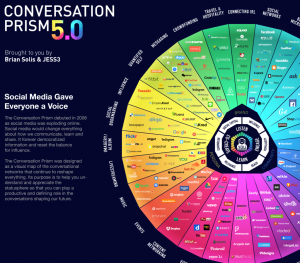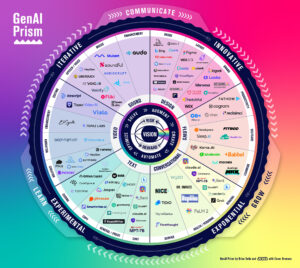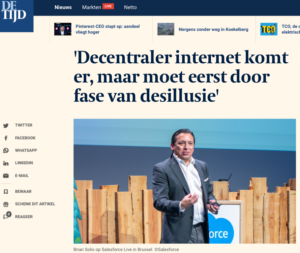
In February 2011, I have the privilege to speak at the lift conference in Geneva. But this isn’t about the conference as much as it is about an important subject that I’ve been asked to address. While this idea is nothing new to economists, theorists, futurists and other intellectuals around the world, my focus is on those who are unfamiliar with the role they play in an underground, but vital economy.
I’m going to explore the undercurrent of social economics, namely social currency and social capital. And, I promise you won’t find it boring…
As we’re seeing with services such as Klout and PeerIndex, our stature in the social web is based on our actions and words. Essentially, your “balance sheet” is available for anyone with a web browser to review, assess, and analyze. While this may seem trivial, progressive businesses are already factoring your stature into their customer index and your experiences may vary based on your social credit score. In addition, some credit agencies in the U.S. are also reportedly reviewing social graphs to explore associated credit risks based on who we know.
You are a bank. What works against us also works for us. Choose your investments wisely…but it starts with thinking about your interaction as investments.
I recently discussed the topic with Laurent Haug, the organizer of lift, and I’d like to share the conversation with you…
Laurent Haug: In what context is social currency emerging?
Brian Solis: We, from the mainstream to the earliest of adopters and greatest of innovators, may have missed an early opportunity to steer things in a more proactive direction. Instead, we are now playing catchup to what’s playing out as we speak… what we do and say in social networks equates to “social capital” and that one day it would be used for and against us.
The time has come to be mindful of the value we create in networks such as Facebook and Twitter, for ourselves. What we share, what we say, the smallest of actions from “likes” to Retweets to the simplest of updates form a digital representation of what we are. This persona can be leveraged when used effectively.
Is that the main reason behind users involvement in social networks?
No, of course not. Right now, the social web is a vibrant “egosystem“. When we were introduced to blogs, Facebook or Twitter, as human beings, we were simply excited at having an audience for our words and our experiences. With every reaction and friend request, we were rewarded to share more of ourselves. Now we realize something new: that what someone says can represent varying levels of value, whether it is an opinion or expertise. Who you are connected to is also important. We are judged by the company we keep. When combined, actions and relationships create a foundation for social capital.
With the emerging array of search and analysis tools, simple processes of data mining encourages advanced profiling that we, as users, are not, but should be, aware of.
For example, banks are looking at an individual’s social graph to determine their credit risk. In the blink of an eye, what could be considered trivial information becomes an influential element that will contribute to changing the direction your life will take. I believe we should make users more aware of this unfolding reality. This is about consciousness. How they engage online and who they connect with serves as social currency in every transaction.
Can you define social currency?
Social currency is represented in the resulting value and sentiment that stems from the exchange of social objects: words, videos, reactions, links. What I publish is social currency. We can measure the value of this currency in each exchange by its reach, resonance, and ultimately influence. However, it’s sum is greater than its parts. If I’m looking to weigh “who you are,” what appears in search as well as the presentation of your profiles, tells me more than you know. It defines who I am and how much I am “worth”. So social currency is a combination of actions and words.
Do you have a concrete example in mind?
While it’s difficult to call out individuals, we can take a look at how brands are establishing goodwill and investing in social capital through online engagement. I do appreciate what American Express is doing around Open Forum. For a brand, it is earning social capital through the investment of meaningful and valuable social currency. Its intention is to build a social community through value-added content, insight, advice, and community. The team is building a network and ecosystem, a complete engagement strategy built on social currency. They enlisted the brightest minds in the field of small business and placed them in a community where these people share content, expertise, and experience with everyone – without cost. It is a form of information commerce, with creation and curation of content. They also launched a mobile app to bring that experience to anyone anywhere. Their idea is to earn social capital by making a contribution to the wider community of small business owners.
What they want is not only immediate returns, but indirect and long term returns. American Express invests in priceless commodities: information and insights. They create a unique bond with the people they want to reach, and build social capital, something even stronger than goodwill. While intent counts, we are measured by what we do, not what we want to do.
RELATED: Stanford Law’s Ryan Calo on privacy harm and design as one solution…
Connect with Brian Solis on Twitter, LinkedIn, Facebook
![]()
___
If you’re looking for a way to FIND answers in social media, consider Engage!: It will help…

___
Get The Conversation Prism:
Image Credit: Shutterstock







You mean 2011?
Thanks Jerome. I caught it right after I hit publish…Happy Holidays!
Had no idea you were in town for LIFT11!! Clearly now a must-do conference 🙂 Thanks.
Splendid post, Brian. I want to add something: Engagement is only as strong as the message itself. I cannot believe how much I’m learning about social media, but where it’s having the most impact for me is in how I am delivering, not simply engaging. I can comment all day on blogs, and I know that’s appreciated, but in return you hope to get value from me in terms of insight — this is that little extra interest my bank can give. That is where the engagement is complete.
Well said Paul.
Right on the mark, Paul. If we were sitting, one-on-one over coffee or tea discussing anything, the satisfaction of our conversation requires contributing content from both of us. Otherwise, it becomes boring and fruitless for both.
And Brian, you’re contribution to the conversation of mankind is enormous. Thank you.
“Egosystem” Love it. You need to trademark that term like Pat Riley did for “Three-peat.”
I suppose I’ll need a TM attorney for egosystem, statusphere, and all the others!
Brilliant post, Brian. This is crucial work and as usual you present it well. Let the conversation continue.
Indeed Kneale, let the conversation continue and expand in reach.
I hosted workshop with the specific focus of Online Privacy in October for a few hundred public sector health workers here in Canada. The Q&A portion was longer than the presentation. The digitization of medical records, younger patients preferring to be contacted on their mobile devices, personal information being shared amongst teenagers on Facebook, these were not only nurses and doctors, they were concerned parents. The topic is dense and far reaching.
Brian ~ Great post. I like how this is a deeper dive into what you discussed with Dan Farber in the (R)evolution series. I wrote a post about it myself, because I had one of those social media “aha moments”. Everything we share reflects who you are a person. It’s so smart for these companies to use this to make more informed decisions.
It’s 100% spot-on that most people just don’t understand the amount of time and resources companies are putting into SM research. Advocacy is paramount in the ever-changing social media landscape.
Happy Holidays
-Andrew
Brian ~ Great post. I like how this is a deeper dive into what you discussed with Dan Farber in the (R)evolution series. I wrote a post about it myself, because I had one of those social media “aha moments”. Everything we share reflects who you are a person. It’s so smart for these companies to use this to make more informed decisions.
It’s 100% spot-on that most people just don’t understand the amount of time and resources companies are putting into SM research. Advocacy is paramount in the ever-changing social media landscape.
Happy Holidays
-Andrew
Andrew, thank you for noticing…Happy Holidays!
Egosystem is a wonderful term, and sums up a lot of what is happening in and around social media at present. It’s great to read your post, and as with any currency we only get to spend it once, so we must be careful how we spend it, a timely reminder, thanks.
I suspect this research is going to produce results far, far more important for our personal well-being than our FICO score.
A book I read a few years ago made asserted, rather strongly, that society would soon divide into those able to process and act on information, and those unable to do so. I believe those authors were very wrong. The division will occur alongs lines of people with personal connections, versus people without personal connection.
That’s a wonderful post Brian. I think more people should read this to become aware that everything on Internet is written in “ink” and there are people who monitor what we do here. Could you also throw some light on DO(s) and DON’T(s) of Social Media so that people may work on improving their social graph?
Hi Brian
Thanks for the shout out.
social currency doesn’t get spent they way normal currency does. You can lose it through bad behaviour (e.g abusing your network with bad tweets) but there are some ways you can ‘spend it’ which actually result in a net gain to you and someone else (an example is retweeting someone).
See you in Feb!
A
Hi Brian!
Thanks for a great sociological reflections! “Boring” isn’t it! For me, also sociologist, your post is interesting investigations in the state of field.
Do you see in the future some “socionomics” form of “normal”, acceptable, and mutual exchange of social and financial capitals. It happens in the social reality that I can earn more financial capital through exchange to social.
It seems that social customers do a lot of useful job for brands. Do they pretend to some direct financial rewarding for it? In the end money are only a form of gifting (not in the sense “corruption”), but today we have no acceptable form to involve money in the marketing, further – socioeconomical, frameworks.
What do you think about as digital sociologist?
Great post. Way to really explain “social currency.” +1!
Brian, great post! Enjoyed your visit to AZ as well.
Great piece, thanks. This is where the internet is going to go, and I suggest art as well – it’ll all be more horizontal rather than hierarchical, networked rather than manufactured. How companies will be able to profit from this remains to be seen. We might be looking at a great age of selfpublishing.
Brian-
You’re right-Promise delivered. It was not a boring ride! Just new to blogging still an exploring tourist with intentions to move on into the Bloggerverse- I am discovering the world-wide grid is really a small town in which it is possible that everyone will be able to know your “business” – Words are the key to our presence here. The point you make about the high importance of choosing well, the point you make about the fact that every little detail, every link you choose to send out, every RT you send forth, all goes into a quite real self-portrait, whether the “you” is an objectified “business” or just the self you are in the process of re-thinking as the brand it is and has always been. Today is the first day of a New Year – and blogging is going to be a central factor in my new architecture. Moving on in’ – Thanks for the post – It induced good creative thought.
and brought me to these quotations:
“There is much to do-Do it now.” – Beethoven
“The important thins is to do and nothing else-be that what it may.” Piccasso
Wayne
Vanessa’s “vital underground economy” has existed since time in memoriam. It is the barter/favor-trading foundation layer of the Global Economy posited by Fernand Braudel in Civilization and Capitalism, 15th-18th Century. I do believe one needs to be mindful of the role of Monopoly Capital layer and the mediating Bourgeois Free Enterprise layer. The real question is not what can we enhance this layer, but how do the new means of social media create social fabric and HOW is that fabric quantified to measure created value. The future of money is really the past and the present of money. It is only in the new forms that money takes. Money is a class, Individual or Corporate Entity are the instances and Value Activities are the form. Very abstract. But then Money is abstract as my 15-year old son noted when he worked in a Seven Eleven in the 80’s. Precociously he noted that the $1 million in currency and coin he handled during the years of his work there were mere tokens of value, not the value itself. His very words were, “Money is abstract, Dad.” My quest for the past years has been to learn how to quantify social fabric. Therein lies the rub.